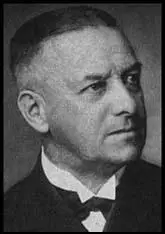Erich Raeder

Erich Raeder, the son of a headmaster, was born in Wandsbek, Schleswig-Holstein, on 24th April, 1876. After a good classical education he entered the Imperial Navy in 1894. He made rapid progress and became Chief of Staff to Franz von Hipper in 1912. During the First World War he saw action and in 1928 was promoted to admiral and head of the German Navy.
Raeder disliked the domestic policies of the National Socialist German Workers Party (NSDAP) but supported Adolf Hitler in his attempts to restore Germany as a great power. In 1939 Hitler promoted Raeder to the rank of grand admiral, the first German to hold this post since Alfred von Tirpitz.
Raeder strategy was to build a German Navy that could challenge the British Navy. This brought him into conflict with Hermann Goering who as director of the German economy directed more resources to the Luftwaffe than the navy.
In October 1939 Raeder sent Adolf Hitler a proposal for capturing Denmark and Norway. He argued that Germany would not be able to defeat Britain unless it created naval bases in these countries. In April 1940 Hitler gave permission for this move but he was disappointed by the heavy losses that the German Navy suffered during the achievement of this objective.
Raeder supported Operation Sealion, the planned German invasion of Britain, but argued that first the Luftwaffe had to gain air superiority. When Hermann Goering failed to win the Battle of Britain Reader advised Hitler to call off the invasion. He was also a strong opponent of Operation Barbarossa.
Adolf Hitler grew increasingly disillusioned with the performance of the German Navy and after the Luetzow and Admiral Hipper failed to stop a large Arctic convoy he accused his commander of incompetence. Raeder resigned in January, 1943 and was replaced by Karl Doenitz as Commander in Chief of the navy.
At the Nuremberg War Crimes Trial Raeder was found guilty of conspiring to wage aggressive war and was sentenced to life imprisonment. He was released in 1955 and in retirement wrote his memoirs Mein Leben (1957). Erich Raeder died in Kiel, on 6th November, 1960.
Primary Sources
(1) The Manchester Guardian (1st February, 1943)
The replacement of Admiral Raeder, Commandet-in-Chief of the German Navy, by the U-boat expert Admiral Donitz (announced on Saturday) is regarded in Sweden as a substantiation of recent signs that Hitler is pinning ail his hopes on winning the war by U-boats. Stockholm reports say that it was known there that Hitler had virtually stopped all major naval building in order to build submarines. It is said that the rate is almost one a day.
Raeder, who "has been appointed Admiral-Inspector" is being relieved of his daily work in the leadership of the Navy" at his own request"
Donitz has been chief of the U-boat fleet. He is reputed to be "the greatest submarine expert" in Germany, and is the inventor of the "wolf-pack" system.
According to the German radio Admiral Donitz, in an address to the German Naval Staff when his flag was hoisted over the German Admiralty, said: "The entire German Navy will henceforth be put into the service of inexorable fight to the finish."
In an order of the day, announced on Saturday, Donitz said he will continue to Command the U-boats, personally.
The dismissal of Admiral Raeder will add to Germany's despair, for he was a man who was trusted, says Reuter. The Navy - least Nazified of the German forces - will deplore, his departure. Raeder put the Navy before the party and as far as possible kept It efficient and self-respecting. He Is replaced by a more ardent Nazi.
